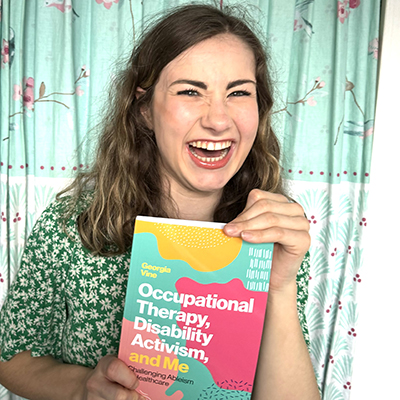Georgia Vine

Georgia is an Occupational Therapist working as a Graduate Teaching Assistant in Occupational Therapy at the University of Huddersfield. During her studies she established her award-winning blog ‘Not So Terrible Palsy’, which explored her experiences as a disabled occupational therapy student and explained how she navigated the barriers she faced during her professional training.
Georgia released her debut book in 2024 titled ‘Occupational Therapy, Disability activism and me’ in which she uniquely analyses her life experiences by using her knowledge as both an occupational therapist and disabled activist.
Presentation at The Society of Tissue Viability 2025 Conference
Challenging ableism in healthcare
Objectives
My session is aimed at healthcare professionals who want to learn more about ableism and want to address to this.
- To explore examples of ableism in healthcare
- To explore the power of lived experiences in raising the profile of ableist narratives
- To identify how ableism can be challenged
Abstract
Background: Is healthcare as person centred as it prides itself to be? Or are we constantly working towards ableist societal standards that aren’t appliable to the diverse population that we work with. Society is built on ableist standards meaning that structures organisations are built on often dehumanise other routines that may be essential for disabled people instating and centring rehabilitation on being ‘able to’ meet these societal norms (Yao et al., 2022, p. 8) reinforcing professional power and actively promoting ableism (Hammell, 2022).
Summary: Georgia uniquely uses her knowledge as both a disabled activist and occupational to analyse her time under children’s services and explore the ableism she unknowingly experienced. Through writing her debut book ‘Occupational Therapy, Disability Activism and Me’ Georgia discovered a lot of ableism that was unknowingly perpetuated through the services she was under throughout her life. Standardised assessments and bottom-up approaches were used throughout Georgia’s healthcare experiences that focused on her ‘deficits’ rather than what she was able to do.
Conclusion: Healthcare is built on systemic ableism that cannot be changed overnight, yet we all have a role to play in challenging this. It times so stop hiding behind the fact that we’re healthcare professional who can’t be ableist and not shy away to create a better future for those that we serve.














